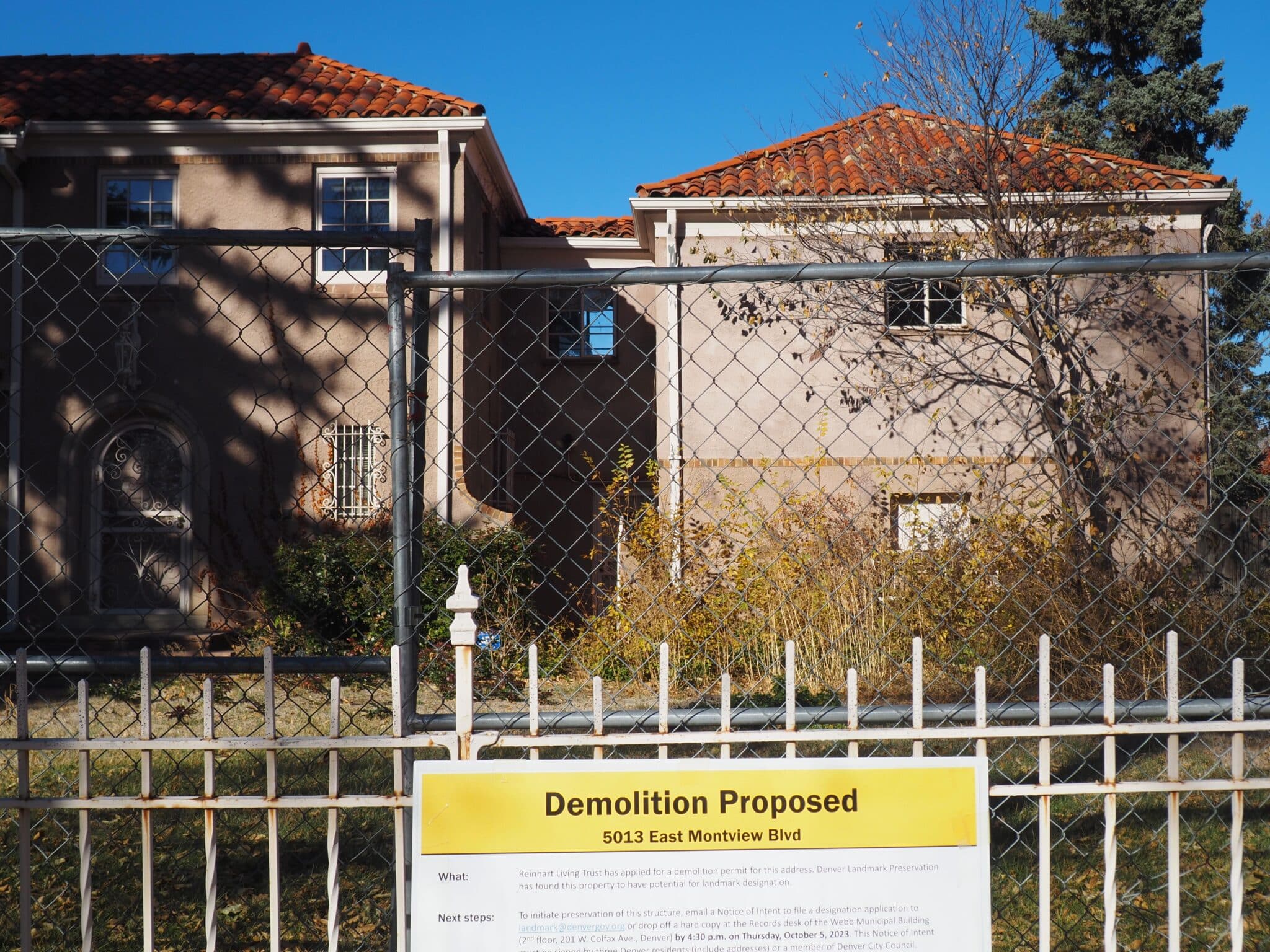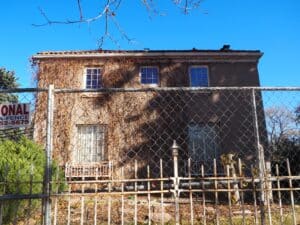
This home at 5013 E. Montview Blvd. in Denver can now be demolished. (BusinessDen file)
The home at 5013 E. Montview Blvd. will not become a city landmark.
Denver’s Landmark Preservation Commission voted 6-0 Tuesday to deny a landmark designation application for the property in the South Park Hill neighborhood. An additional three commission members recused themselves from the vote due to a possible conflict of interest.
The application — submitted by three Park Hill residents — was opposed by the property’s owners, Mark and Marianne Rinehart, who bought the home for $2.5 million in 2022, intending to demolish it and build a new one.
Landmark status, if approved, would have effectively prevented demolition of the existing structure. The commission’s other option was to forward the application to the Denver City Council and recommend approval. But the council won’t take it up as a result of the denial.
“We’re relieved,” Marianne Rinehart said after the meeting.

Mark Rinehart and family (Courtesy Mark Rinehart)
Applicants Margaret McRoberts, Trish Leary and Bernadette Kelly had pointed to the home’s prominent location, architectural style, original homebuilder and previous occupants — most notably movie theater owner Harry Huffmann — as reasons to preserve it.
The Rineharts noted Huffman lived there for only a couple years, and the home wasn’t built specifically for him. They argued the homebuilder wasn’t prominent and only the structure’s roof corresponded to Italian Renaissance Revival, the architectural style the applicants cited.
A majority of those that contacted the commission opposed landmark status. By the time the meeting started Tuesday, the commission had received 70 emails in opposition and 21 emails in support. The commission also received letters of support from four neighborhood organizations representing Park Hill, Whittier, Berkeley/Regis and City Park West.
At the meeting, 15 individuals spoke in opposition of landmark status, while four spoke in support, including the head of Historic Denver. Several touched on the environmental impact of demolishing and rebuilding, despite that not being a factor the commission is allowed to consider.
The commissioners ultimately agreed with city staff, which had said the applicants didn’t do enough research to justify their arguments. Kelly told BusinessDen the trio rushed through completing the application because they were focused on city-required mediation sessions and had hoped an application wouldn’t be needed.
“It was not the tome that Landmark expected,” Kelly said.
Kelly noted that, while the commission denied the application, several members did voice concern that Park Hill was losing its history.
“I do think that this is a loss … The sentiment of what attracts people to this neighborhood is being chipped away at,” said commissioner Erika Warzel.
Commissioner Anne Wattenberg called owner-opposed applications “the most wrenching part of this commission,” but said it was unlikely the council would support landmark status. The council has approved only two owner-opposed landmark designations, with one of those coming last year.

The side of the home at 5013 E. Montview Blvd. (BusinessDen file)
Denver changed the process for owner-opposed applications several years ago, hoping to encourage compromise. But after the meeting, the Rineharts and their attorney, Sarah Kellner of Denver’s Davis Graham & Stubbs, said they believe more changes are needed.
The Rineharts noted they engaged with city permitting staff for months and spent tens of thousands on plans for their new home before learning of the potential for landmark designation — a process with which they were unfamiliar.
“We were completely blindsided,” Marianne Rinehart told the commission. “We had no idea this could happen, and I remember crying to Mark that night.”
Mark Rinehart said the application fee, currently $875, needs to be higher. He expressed frustration that the couple attended mediation with individuals who didn’t end up being the actual applicants.
Kellner warned that landmarking can “create an avenue for NIMBY concerns,” referring to those who oppose development near their properties, and said the city’s landmark process should include discussion of who will pay for maintenance of a property.
“They need to refine their criteria,” Kellner said.

This home at 5013 E. Montview Blvd. in Denver can now be demolished. (BusinessDen file)
The home at 5013 E. Montview Blvd. will not become a city landmark.
Denver’s Landmark Preservation Commission voted 6-0 Tuesday to deny a landmark designation application for the property in the South Park Hill neighborhood. An additional three commission members recused themselves from the vote due to a possible conflict of interest.
The application — submitted by three Park Hill residents — was opposed by the property’s owners, Mark and Marianne Rinehart, who bought the home for $2.5 million in 2022, intending to demolish it and build a new one.
Landmark status, if approved, would have effectively prevented demolition of the existing structure. The commission’s other option was to forward the application to the Denver City Council and recommend approval. But the council won’t take it up as a result of the denial.
“We’re relieved,” Marianne Rinehart said after the meeting.

Mark Rinehart and family (Courtesy Mark Rinehart)
Applicants Margaret McRoberts, Trish Leary and Bernadette Kelly had pointed to the home’s prominent location, architectural style, original homebuilder and previous occupants — most notably movie theater owner Harry Huffmann — as reasons to preserve it.
The Rineharts noted Huffman lived there for only a couple years, and the home wasn’t built specifically for him. They argued the homebuilder wasn’t prominent and only the structure’s roof corresponded to Italian Renaissance Revival, the architectural style the applicants cited.
A majority of those that contacted the commission opposed landmark status. By the time the meeting started Tuesday, the commission had received 70 emails in opposition and 21 emails in support. The commission also received letters of support from four neighborhood organizations representing Park Hill, Whittier, Berkeley/Regis and City Park West.
At the meeting, 15 individuals spoke in opposition of landmark status, while four spoke in support, including the head of Historic Denver. Several touched on the environmental impact of demolishing and rebuilding, despite that not being a factor the commission is allowed to consider.
The commissioners ultimately agreed with city staff, which had said the applicants didn’t do enough research to justify their arguments. Kelly told BusinessDen the trio rushed through completing the application because they were focused on city-required mediation sessions and had hoped an application wouldn’t be needed.
“It was not the tome that Landmark expected,” Kelly said.
Kelly noted that, while the commission denied the application, several members did voice concern that Park Hill was losing its history.
“I do think that this is a loss … The sentiment of what attracts people to this neighborhood is being chipped away at,” said commissioner Erika Warzel.
Commissioner Anne Wattenberg called owner-opposed applications “the most wrenching part of this commission,” but said it was unlikely the council would support landmark status. The council has approved only two owner-opposed landmark designations, with one of those coming last year.

The side of the home at 5013 E. Montview Blvd. (BusinessDen file)
Denver changed the process for owner-opposed applications several years ago, hoping to encourage compromise. But after the meeting, the Rineharts and their attorney, Sarah Kellner of Denver’s Davis Graham & Stubbs, said they believe more changes are needed.
The Rineharts noted they engaged with city permitting staff for months and spent tens of thousands on plans for their new home before learning of the potential for landmark designation — a process with which they were unfamiliar.
“We were completely blindsided,” Marianne Rinehart told the commission. “We had no idea this could happen, and I remember crying to Mark that night.”
Mark Rinehart said the application fee, currently $875, needs to be higher. He expressed frustration that the couple attended mediation with individuals who didn’t end up being the actual applicants.
Kellner warned that landmarking can “create an avenue for NIMBY concerns,” referring to those who oppose development near their properties, and said the city’s landmark process should include discussion of who will pay for maintenance of a property.
“They need to refine their criteria,” Kellner said.
